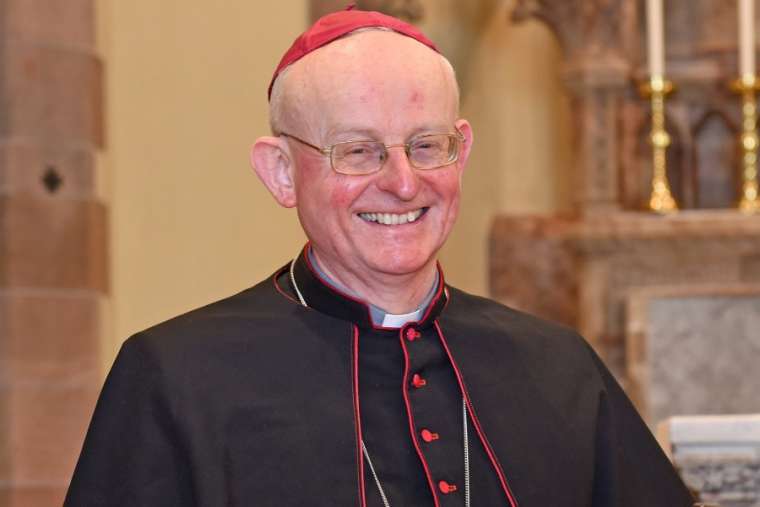Scottish Catholics called back to Mass as bishops announce reintroduction of Sunday obligation
The obligation for Catholics to attend Mass on Sunday and Holy Days is to be re-introduced in Scotland from the beginning of Lent. The announcement from the Catholic bishops came just a week after the government of Nicola Sturgeon relaxed a wave of new restrictions brought in to slow down the spread of the Omicron The post Scottish Catholics called back to Mass as bishops announce reintroduction of Sunday obligation appeared first on Catholic Herald.

The obligation for Catholics to attend Mass on Sunday and Holy Days is to be re-introduced in Scotland from the beginning of Lent.
The announcement from the Catholic bishops came just a week after the government of Nicola Sturgeon relaxed a wave of new restrictions brought in to slow down the spread of the Omicron variant of the coronavirus.
Unlike in England, Catholics in Scotland will have to attend Mass with a face covering because the Scottish Government is insisting they must still be worn by adults in all indoor settings.
Social distancing rules will also remain in place, with unrelated groups and individuals having to keep at least a metre away from each other.
The Scottish bishops initially sought to reintroduce the Sunday obligation in time for last Christmas but were forced to shelve their plans as the comparatively weaker but more infectious strainof Covid-19 spread throughout the UK.
Bishop Hugh Gilbert of Aberdeen, president of the Bishops’ Conference of Scotland, said in a statement yesterday that the time had now come for Catholics to confidently return to Mass each week.
“The obligation for Catholics to celebrate Sunday as a Holy Day by gathering together for Mass will be restored from the First Sunday in Lent, Sunday 6th March,” he said.
“Given the easing of restrictions in every other walk of life, the Church looks forward to welcoming Catholics back to Holy Mass.
“As always, the obligation does not apply to those who are sick and their carers or to those aware of their greater vulnerability to the virus.”
He continued: “May the continuing recovery of our country bring new hope to us all especially those who are ill, those who mourn loved ones, those who are apprehensive and those who have sustained us in so many ways throughout the Pandemic.
“We, the Bishops of Scotland, take this opportunity to thank our clergy and our parish volunteers for all their efforts. May our Lenten journey this year lead us to a renewed appreciation of our Catholic faith, of the celebration of the Eucharist and of the presence of the Risen Christ who is always at our side.”
The bishops of England and Wales decided at their autumn plenary meeting in Leeds in November that they would not reintroduce the Sunday obligation until it was safe to do so.
Instead, they encouraged people who are not vulnerable to make going to Mass a higher priority on Sundays than “sports or shopping”.
“The pandemic is clearly not over,” ,” they said in a statement at the time. “The risk of infection is still present. For some, there is legitimate fear in gathering together.
“As your bishops, we recognise that these prevailing circumstances suggest that not everyone is yet in the position to fulfil the absolute duty to attend freely Sunday Mass.”
Last month, “Plan B” Covid restrictions were radically eased by Boris Johnson, meaning that face masks are now optional rather than compulsory in churches and that there is no social distancing.
Singing is allowed, hymn and liturgical books may be shared, the sign of peace is restored and holy water stoups may be refilled.
On Ash Wednesday, which falls on March 2, priests will also be able to administer ashes with their thumbs instead of a cotton bud.
Bishops and priests will no longer use cotton buds for anointing during the Sacrament of Confirmation and the Sacrament of the Sick.
Canon Christopher Thomas, general secretary of the Bishops’ Conference of England and Wales, said: “The scientific consensus is that society is moving towards the stage where the virus is transitioning from the pandemic phase to the endemic phase, but … there is still a risk associated with gathering for sustained periods in enclosed spaces and therefore there needs to be continued caution by all against infection.
“This, however, has to be balanced against the need to move forward safely towards a normal lifestyle and these two positions will always be held in tension,” he said.
“This holding in tension is the key to living safely with Covid-19, namely keeping infections from a virus that cannot be eliminated to levels which minimise disruption to people’s lives.”
He added: “Whilst this reduction of restrictions brings about a more normal way of living, the Covid-19 virus is still in circulation, and this should be in the mind of those participating in the life of the Church as time goes forward holding in balance the need for personal safety and taking responsibility for that safety.”
Continuing precautions include ministers of Holy Communion continuing to sanitize their hands and the regular replacement of holy water used by people for blessing themselves when they enter and leave churches.
At present, priests are also being advised to administer Holy Communion only in the form of consecrated hosts rather than in both forms.
(Photo of Bishop Gilbert courtesy of the Scottish Catholic Media Office)

The post Scottish Catholics called back to Mass as bishops announce reintroduction of Sunday obligation appeared first on Catholic Herald.














